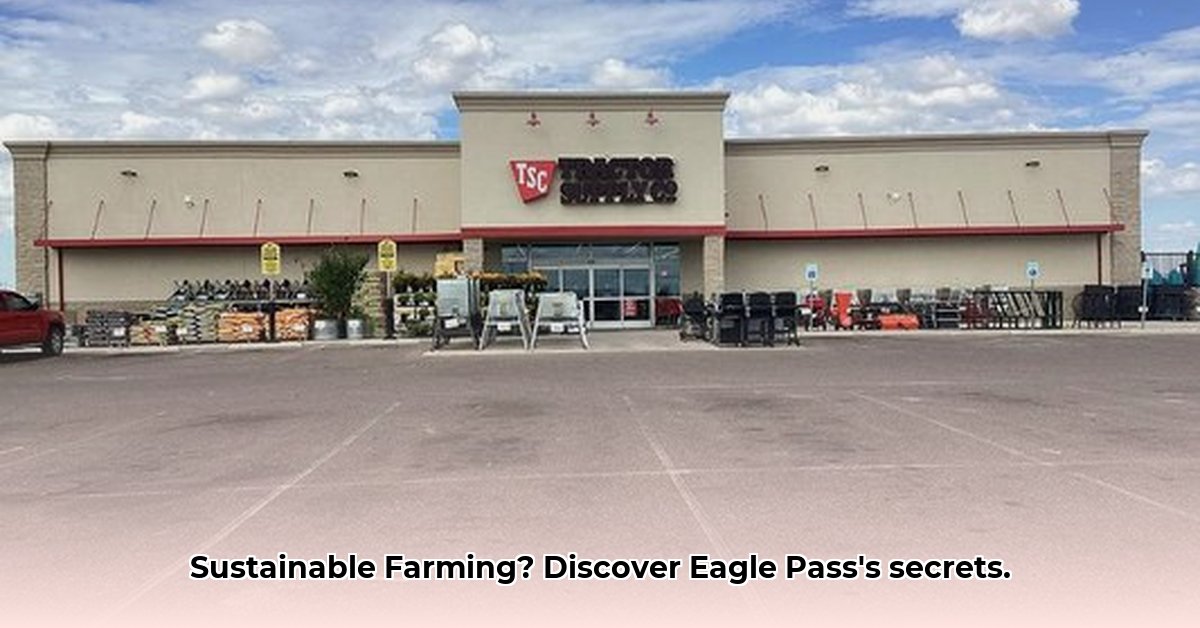
Eagle Pass Tractor Supply (TS) serves as a vital resource for local farmers and gardeners. However, the extent to which it contributes to sustainable agriculture within the community remains unclear. This guide examines TS's offerings, identifies gaps in its sustainability practices, and offers actionable recommendations for the store, community members, and local government to foster a more sustainable agricultural future in Eagle Pass. For more information on Tractor Supply's sustainability efforts, visit this website.
What Eagle Pass Tractor Supply Offers Sustainable Farmers
TS stocks a wide range of products that can support sustainable practices. These include seeds (though specific certifications like organic need clarification), water-efficient irrigation systems, tools promoting soil health (e.g., hand tools, tillers), and livestock feed (sourcing transparency needed). The availability of these items makes sustainable practices more accessible to both large-scale farmers and home gardeners. However, the mere presence of these products doesn't equate to a commitment to sustainability.
Assessing Tractor Supply's Commitment to Sustainability
While TS offers tools for sustainable agriculture, its own sustainability practices lack transparency. Crucial information regarding the sourcing of products (seeds, feed, tools) is missing. Are these items sourced sustainably? Are certifications like organic or fair trade prioritized? Without this information, it's impossible to fully assess TS’s environmental footprint.
Furthermore, data on waste management practices within the store is needed. What percentage of TS's packaging is recyclable or compostable? Does the store actively promote recycling among customers? The lack of readily available information hinders a complete evaluation of TS's overall environmental responsibility. Finally, evidence of community engagement initiatives is minimal. Does TS offer workshops or educational resources on sustainable farming? Does the store partner with local environmental organizations? This information is crucial to understanding their full contribution.
How can we bridge this information gap? A comprehensive environmental audit covering the entire supply chain, from sourcing to waste disposal, is the first crucial step.
Improving Sustainability at Eagle Pass Tractor Supply: A Roadmap for Progress
Significant improvements require a multi-pronged approach. Here's a plan for enhancing sustainability at TS, for local farmers and gardeners, and for local government.
Recommendations for Tractor Supply (Eagle Pass)
Short-Term Goals (0-1 year):
- Conduct a comprehensive environmental audit: Analyze the entire supply chain to identify areas for improvement in sourcing, packaging, and waste management.
- Implement a robust recycling program: Make recycling readily available and clearly promote it within the store. Provide education on proper waste disposal practices.
- Initiate local partnerships: Collaborate with community gardens, schools, and local organizations to promote sustainable agriculture.
Long-Term Goals (3-5 years):
- Develop a detailed sustainability plan: Set specific, measurable, achievable, relevant, and time-bound goals (SMART goals) with a detailed timeline. Areas of focus should include waste reduction, responsible sourcing, and community engagement.
- Expand sustainable product offerings: Increase the availability of organically certified seeds, tools made from recycled materials, and other eco-friendly products.
- Invest in employee training: Provide comprehensive training for employees on sustainable agriculture practices and responsible product selection. Empower them to advise customers effectively.
Recommendations for Local Farmers and Gardeners
Short-Term Actions:
- Make informed purchases: Choose products that align with your sustainability goals, prioritizing eco-friendly options. Actively seek out products from companies with robust environmental policies.
- Engage in dialogue: Ask store employees about the sourcing and environmental impact of products. Your questions can drive transparency and positive change.
Long-Term Actions:
- Advocate for change: Provide constructive feedback to TS management, emphasizing the importance of sustainable practices. Support businesses that share your values.
- Participate in community initiatives: Engage in local workshops and events focused on sustainable agriculture, sharing your knowledge and encouraging others.
Recommendations for Local Government
Short-Term Actions:
- Support policies promoting sustainability: Advocate for local ordinances and incentives supporting sustainable agriculture and waste management.
- Foster partnerships: Facilitate collaboration between TS and local organizations to promote education and sustainable practices.
Long-Term Actions:
- Create financial incentives: Offer grants or tax breaks to businesses and farmers adopting sustainable agriculture methods.
- Invest in educational programs: Fund workshops, training sessions, and other educational initiatives on sustainable agriculture and environmental stewardship.
Sustainable Agriculture: A Collaborative Effort
A sustainable agricultural future in Eagle Pass requires a collective effort. By collaborating effectively—farmers, gardeners, Tractor Supply, and local government—we can create a more resilient and environmentally responsible food system. Let’s work together to make conscious choices and advocate for change. The future of our land depends on it.